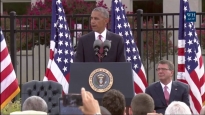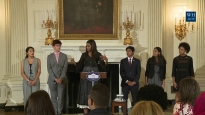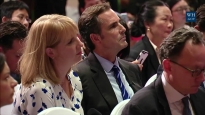President Obama Talks About My Brother's Keeper
May 30, 2014 | 6:50 | Public Domain
President Obama meets with the My Brother's Keeper Task Force and discusses their 90-day report.
Remarks by the President with the "My Brother's Keeper" Task Force
Roosevelt Room
12:35 P.M. EDT
THE PRESIDENT: Earlier this year, I launched something we’re calling “My Brother’s Keeper,” and I think that many of you recall me talking in very personal terms about someone who grew up without a father and made some mistakes when I was young, but benefitted from the love and attention and opportunities that were given to me during the course of growing up, and the fact that we have too many young men of color -- black boys and young men, Latino boys and young men -- who are adrift and don’t have those same opportunities and don’t have those same structures of support.
The idea behind “My Brother’s Keeper” was that there are a lot of folks that want to do something, but we hadn’t created a platform, a mechanism to gather all those resources together, concentrate and focus on them, get good data, figure out what the best practices are, and then go out there and implement.
And so what I did was assign a process for us to inventory everything that’s already being done to help young boys of color and men of color to succeed, to have every agency -- from Justice Department to Education to HUD to USDA -- look at how they could contribute to the process to make sure that we’ve got the best data possible, and then to report back to me so that we can have a plan of attack.
Today, thanks to the good work of my Cabinet Secretary, who has been heading this up as well as our Deputy Secretary of Education -- Broderick Johnson and Jim Shelton, they’ve presented to me our report on what we need to be doing. And it is comprehensive and it goes -- everything from making sure that we’ve got better early childhood education to finding better ways to create apprenticeship programs and job-training programs and mentorship programs; how do we modify policies in schools where young men of color are being disproportionally suspended -- which we know results in higher dropout rates, which we know results potentially in them ending up in the prison system -- all the way to how do we deal with young people who have gotten into trouble with the law but can be redeemed if we have effective ways of reaching them.
With this task force report, we’re now looking to implement. And we’re partnering with philanthropies, we’re partnering with businesses, we’re partnering with community organizations and non-governmental organizations that are already doing great jobs on the ground but feel isolated and disconnected from other efforts in other places.
And the goal then is going to be for us over the course of the next couple years to really put in place not only an all-hands-on-deck effort on the federal level, but a partnership with the private sector so that we can see some concrete outcomes. And we’ve already got enormous enthusiasm from mayors around the country, many of whom tell us that this is the single-most important priority that they have in ensuring that their cities will thrive. We’ve got businesses who are saying, we know this is going to be the workforce of the future, and if we do not address this demographic, our companies aren’t going to prosper and the American economy as a whole is not going to grow as quickly as it could.
We know that there is enormous enthusiasm from faith-based groups that feel as if they’re laboring out there on their own and want to connect up with others. We know that our national service programs have real interest in figuring out how this works.
So you’re going to see a rollout over the next several weeks of some very specific commitments that have already been made. We have benefited from input from a whole range of sources. There have been listening tours that Broderick and Jim have conducted in cities all across the country.
I want to thank the CEO of Deloitte, Joe Echevarria, as well as Magic Johnson, who are going to be leading an external push to get more folks on board. And I also want to thank members of Congress who have given us some great input, as well.
One of the big pushes we’re going to make because of the timing is on summer jobs. And already we’re seeing I think a much greater sense of urgency this summer about putting these young people in opportunities where they can learn the basic skills that they’re going to need to get attached to the labor market.
So overall, I’m very happy with the report. We’ll give the press the report and our executive summary to see the very specific steps, the things that we know are going to work. And we are going to be rolling out over the next several weeks more specifics about commitments that we’ve obtained, and you can expect over the course of the next year, you’re going to be getting more news from us about the successes that we’re achieving and the lessons that we’ve learned.
But the bottom line is this: As we approach Father’s Day, I’m just reminded that I am only here because a bunch of folks invested in me. We’ve got a huge number of kids out there who have as much talent, and more talent than I had, but nobody is investing in them. And I want to make sure that I use this platform, and every Cabinet member here wants to make sure that they use the tools that they’ve got, so that these young men, young boys, know somebody cares about them, somebody is thinking about them, and that they can succeed, and making America stronger as a consequence.
Thank you very much, everybody.
END
12:42 P.M. EDT
|
September 11, 2016
|
September 10, 2016
|
September 9, 2016
|
September 8, 2016
|
|
September 8, 2016
|
September 8, 2016
|
September 7, 2016
|
September 7, 2016
|
- &lsaquo previous
- …
- 24
- 25
- 26
- 27
- 28
- 29
- 30
- 31
- 32
- …
- next &rsaquo







